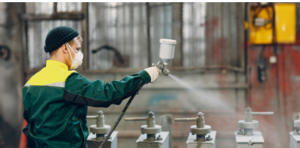Industrial painters specialise in many different areas, from specialty areas such as car painting to sandblasting surfaces in preparation for new coatings.
A professional industrial painters Auckland requires excellent technical knowledge and skills, superior attention to detail, colour expertise, and quality control capabilities. They must communicate clearly and be punctual.
Certification
 Industrial painters must hold certifications from SSPC, NACE and CAS; these industry-recognised organisations set high standards in coating application and surface preparation techniques that set apart successful candidates in this profession. Employers and other contractors need evidence that you take your trade seriously and possess all the skills to succeed as an industrial painter.
Industrial painters must hold certifications from SSPC, NACE and CAS; these industry-recognised organisations set high standards in coating application and surface preparation techniques that set apart successful candidates in this profession. Employers and other contractors need evidence that you take your trade seriously and possess all the skills to succeed as an industrial painter.
At least in most industrial painting positions, formal education isn’t usually necessary to find work; however, earning a bachelor’s degree could significantly enhance your earning potential. Majors like industrial technology and precision metalworking provide invaluable experience with commercial painters’ equipment. Automotive technology degrees may also prove helpful as an entryway into auto body work.
Industrial painting requires more than the right credentials – you will also require physical stamina, a strong work ethic, and an excellent eye for detail to succeed in this profession. A keen ability to identify and correct errors during the preparation and painting phases will be invaluable. At the same time, effective communication skills will enable you to effectively delegate tasks or operate equipment when working alongside other painters or clients.
Punctuality is paramount to making projects run smoothly and demonstrating your reliability, allowing the project to move ahead without complications. Furthermore, be open to hearing feedback from colleagues and professionals on what changes could be made to improve your process.
Industry Requirements
As a professional industrial painters Auckland, you must possess an in-depth knowledge of painting techniques and applications and adhere to safety standards applicable in your work environment.
Additionally, you must possess excellent communication and interpersonal skills. These will assist in marketing your services to clients and building lasting relationships. Moreover, having a strong work ethic that allows for meeting deadlines is also vitally important.
Industrial painting is an expansive industry with numerous subspecialty options that evolve. To remain current in your painting endeavours, always be open to learning new concepts and techniques as they emerge; be familiar with abrasive blasting, metal pickling and degreasing surface treatments (abrasive blasting, metal pickling and industrial degreasing are just three examples of such treatments).
Safety Practices
Painting requires sanding, brushing and spraying materials that could cause skin damage, respiratory issues or eye injuries if misapplied. Specialised training in safety practices must also be acquired for workers operating at heights while staying away from energised electrical equipment or utility lines.
As another key component in selecting a professional painter, ensure they carry liability and worker’s compensation insurance in case someone gets hurt on the job site. Also, check their reputation by joining trade organisations or local community organisations.
Rob recognises the value of his facility’s components and understands that an effective painting project can extend their lives. To this end, he does his research, communicates with his team and customers regarding the process, budgets accordingly and takes his time completing it right and avoiding costly errors.
Working Conditions
Painters work at construction sites, offices and residential properties, coordinating with contractors or project managers to ensure an efficient painting process. Painters may need to wear protective gear while working in tight spaces or high structures and follow safety regulations to prevent accidents. Furthermore, they must know about cleaning techniques for maintaining equipment, including stripping away existing layers of paint from surfaces they need to paint over.
Professional industrial painters Auckland looking to enter this profession can complete an apprenticeship program combining classroom instruction and paid on-the-job training. The duration of an apprenticeship program depends on its employer; some apprenticeship programs offer credits that count towards earning a certificate of completion.
Qualifications vary among industrial painters; most possess at least a high school diploma and experience working on the job. Some attend vocational-technical schools to learn about various coatings and application methods; these professionals may even become certified so their skill set becomes even more attractive to employers.